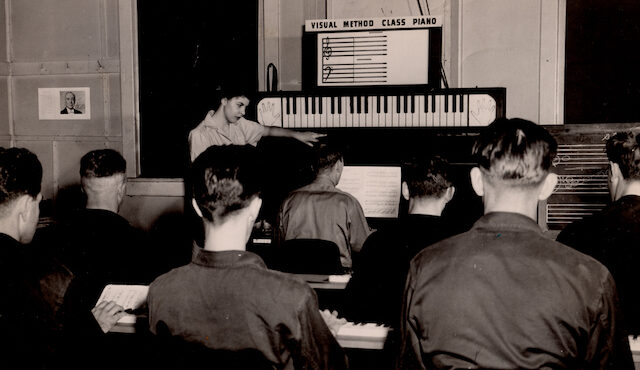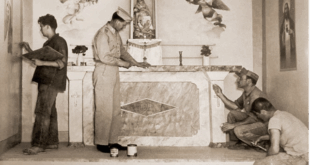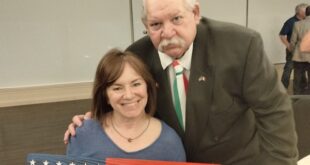A singer and pianist, Marie Sartor Pawelek used her talents to heal the wounded psyches of soldiers on the mend at Walter Reed General Hospital during World War II.
Marie Sartor Pawelek was born 100 years ago in Eveleth, Minnesota, the only child of Luigi and Eva (Pivetta) Sartor. Her parents emigrated from a small town near Venice, Italy. With all of their relatives back home in Italy, Pawelek’s parents socialized with their Italian neighbors. Luigi joined the Order Sons of Italy in America and Eva was active in the Sacred Heart Society of their church.
Their parish priest built a bocce court, hoping to entice the men to attend Mass. Pawelek chuckles as she remembers, “The windows of the church were open and he’s doing a sermon and he’s hearing these Italian men swearing outside and he had the altar boy go and close all the windows.”
Pawelek’s mother prepared homemade meals and baked goods for the family. “We lived on polenta, I bet three times a week, except on Sunday, we had pasta,” says Pawelek. She attended Lincoln Grade School and Eveleth High School, graduating in 1942. Pawelek began piano lessons when she was 8 years old and added voice lessons when she was 14. “I often think to myself,” she says, “‘my parents weren’t rich, I was raised during the Depression, how could they afford piano and voice?’”
Pawelek participated in every school musical, and local social organizations hired her to entertain after their business meetings. “I used to sing and play the piano,” she says. “They would give me one dollar. I used to come home and give it to my mother and she would give me 50 cents and keep the rest.”
Pawelek attended the College of St. Scholastica in Duluth for one year. It was 1943, the war was raging and Pawelek wanted to do her part. “Every fella in my graduation class went,” Pawelek says. “I thought, ‘I gotta go! I gotta go!’ My folks said, ‘No, no, no!’”
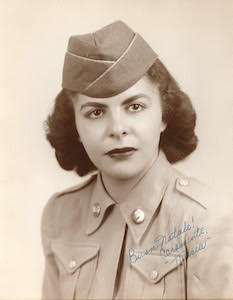 A family friend talked to her parents and said, “Let her go. She’s not going to get hurt or anything.” They finally agreed and Pawelek enlisted in the Women’s Army Corps in 1943. She had basic training in Des Moines, Iowa, and after that, she was selected for medical training at Beaumont General Hospital in El Paso, Texas. She completed the eight-week medic program and received her assignment. “I got lucky when they said Walter Reed General Hospital in Washington, D.C.,” Pawelek says. “That was like going to Disneyland.”
A family friend talked to her parents and said, “Let her go. She’s not going to get hurt or anything.” They finally agreed and Pawelek enlisted in the Women’s Army Corps in 1943. She had basic training in Des Moines, Iowa, and after that, she was selected for medical training at Beaumont General Hospital in El Paso, Texas. She completed the eight-week medic program and received her assignment. “I got lucky when they said Walter Reed General Hospital in Washington, D.C.,” Pawelek says. “That was like going to Disneyland.”
Wounded and injured soldiers were stabilized and flown to Walter Reed, the medical center of the Army. It was primarily an orthopedic hospital during the war. The majority of the patients were amputees and prosthetics were made in a factory in the hospital basement. Some of the duties Pawelek performed were feeding patients, making beds, giving baths, administering and maintaining bedpans, cleaning tracheotomy tubes and giving subcutaneous injections.
It was not always easy caring for the young, wounded soldiers, some the same age as Pawelek, but she did her job and liked what she did. “And, there was a piano; I used to play the piano in the hospital and entertain some of the patients,” Pawelek chuckles.
The music was soothing for staff as well as patients. When the commanding officers discovered Pawelek’s musical background, they decided to try using her for shell-shocked patients. “So they trained me,” says Pawelek, “and from there on, no more bedpans! I loved it!” Patients were selected by psychiatric doctors.
Each participant sat at his own cardboard keyboard, lettered with the notes of the scale, as Pawelek sat at her piano. Pawelek played the piano, calling out the notes, while the soldiers played along on their cardboard keyboard. She went around to each soldier checking that he was hitting the right notes. “I only taught them four notes at a time,” Pawelek says. “Then I played a simple little song with those keys.” Once they learned it on the cardboard keyboard, each soldier came up to the piano and played the notes. “Their faces lit up as they actually heard what they learned on a real piano,” she says.
The military was the first to use music as therapy for what is now called Post Traumatic Stress Disorder, or PTSD. Due to the dedicated efforts of physicians and musicians, music became recognized for its healing powers for the mental and physical recovery of wounded soldiers. “Oh, it was amazing,” says Pawelek as she remembers the patients’ response. “You could see the change in them; the music made a difference.”
Pawelek remembers one patient whom she felt sorry for, a double amputee who had been bedridden for months and was finally able to get out of bed. “So I thought I’m going to take him to a bar!” says Pawelek. She helped the young soldier into a wheelchair and wheeled him past the guard. “They didn’t know where we were going,” she says. Pawelek took him to a bar a couple blocks away from the medical center and then started back. “I thought, ‘I’ll never get past those guards coming in,’” she says.
Pawelek wheeled the soldier to a section of the hospital with a fence. “I said, ‘Pete, you think I can throw you over the fence?’ He said, ‘Sure, don’t worry about it,’” Pawelek chuckles. “I threw the wheelchair, and then I threw him, and we went right back to the hospital.” Pawelek settled her patient back in bed and left. The next morning, she accompanied the doctor during rounds. “When we got past him (Pete), he looked up at me and winked,” says Pawelek.
Pawelek sent her ration stamps to her parents, who did not smoke or own a car, and her mother traded the cigarette and gas stamps for food items. “She was a great baker and she got sugar and butter and all that for the cigarettes,” Pawelek says.
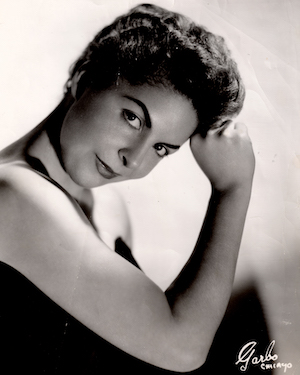 Pawelek was discharged as Corporal in 1945, returned home and then, under the GI Bill, studied music for two years at Sherwood Conservatory of Music in Chicago. While a student, she entertained at numerous piano bars, playing and singing the blues. Pawelek enjoyed a successful 26-year career entertaining at Eli’s The Place for Steak in Chicago. “It was the best piano bar in the world,” she says. “We had everybody that was anybody there.”
Pawelek was discharged as Corporal in 1945, returned home and then, under the GI Bill, studied music for two years at Sherwood Conservatory of Music in Chicago. While a student, she entertained at numerous piano bars, playing and singing the blues. Pawelek enjoyed a successful 26-year career entertaining at Eli’s The Place for Steak in Chicago. “It was the best piano bar in the world,” she says. “We had everybody that was anybody there.”
She has one son, Michael, a veteran of the U.S. Marine Corps who served during the Vietnam War; one grandson, an Eagle Scout; and one granddaughter. In 2015, Pawelek was the only female veteran on the plane when she boarded an Honor Flight to the nation’s capital. She and her granddaughter are Honor Flight volunteers and send birthday cards to veterans around the country. Pawelek recently served as grand marshal of the Park Ridge Memorial Day Parade.
As a teen during the war, Pawelek was determined to help her country despite her parents’ misgivings. She remembers administering aid and music therapy to the wounded soldiers, as well as entertaining them, and says, “It was the best time of my life.”
The above appears in the August 2024 issue of the print version of Fra Noi. Our gorgeous, monthly magazine contains a veritable feast of news and views, profiles and features, entertainment and culture. To subscribe, click here.
 Fra Noi Embrace Your Inner Italian
Fra Noi Embrace Your Inner Italian


